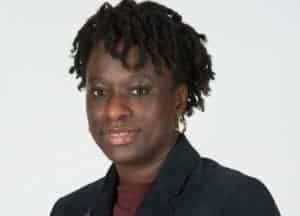Before Arkansas had its first COVID-19 case, the reality of the impending pandemic was already setting in for UAMS faculty as cancellations for scientific conferences worldwide were announced one after another like falling dominos.
For scientists and academics, presenting to their peers at conferences is one of the main ways other than publications that they share their latest findings, learn about advances in the field, and gain the kind of resume fuel that can make or break careers as they work toward promotion and tenure.
For each presentation, there might be years of work behind it. This can be especially disappointing for the clinical faculty who are hardest hit by the pandemic. It often requires more effort for them to find the time to conduct research as they try to balance it with their clinical and educational duties.
Theresa O. Wyrick-Glover, M.D., an associate professor in the Department of Orthopaedic Surgery, was an invited lecturer at the Philadelphia Hand Symposium, a conference she has participated in for the past 10 years.
“It is a large meeting with national and international participants,” Wyrick said. “It was canceled the week of the meeting. I had obviously put a great deal of effort into my presentation and work product and was very disappointed that I was unable to present it.”
Wyrick’s was a story repeated countless times across campus.
The staff in the Faculty Affairs office are highly attuned to the promotion and tenure needs of faculty and saw an opportunity to help. They created an online Scholarly Product Repository so UAMS faculty will have a place to publicly display the work they would have otherwise showcased at the canceled events of spring 2020.
“This project is designed to provide faculty with a public avenue to share the information that they would have otherwise shared at conferences, nationally and internationally,” said Beatrice A. Boateng, Ph.D., assistant dean for faculty assessment and evaluation in the COM and director of evaluation in the Translational Research Institute.
While the project began with the College of Medicine, it has been expanded to include all colleges. Students can also submit their work.
Boateng repurposed existing database software used in the institute to quickly begin accepting peer-reviewed and accepted abstracts, posters and other scholarly work via an easy-to-use interface. The research will soon be posted online, thanks to existing infrastructure in the COM.
“Several research faculty and their chairs have expressed gratitude for this tool, and Dr. Boateng was a key player in making it happen so quickly and so well,” said Erick Messias, M.D., Ph.D., associate dean for Faculty Affairs. “She has been a great addition to the Faculty Affairs team and has definitely helped to strengthen our partnership with the Translational Research Institute.”
Wyrick said it gave her a way to salvage would could have been lost time and effort.
“The UAMS Scholarly Product Repository gave me an opportunity to present and showcase my efforts and to make the content available to an interested audience,” Wyrick said. “Additionally, this platform allows me to list this presentation on my CV, which is important for promotion and tenure.”
Brenda Burks, assistant director for the Faculty Center, said it also gave the staff in the Faculty Center a way to support the wider UAMS community during difficult times.
“I felt like it is important for those of us who are non-clinical to find a way to really focus our efforts during COVID-19,” Burks said. “So much is being asked of our clinical faculty right now. It was important to me to find a way to support them that felt meaningful.”
To make a submission, visit the UAMS Scholarly Product Repository online.



